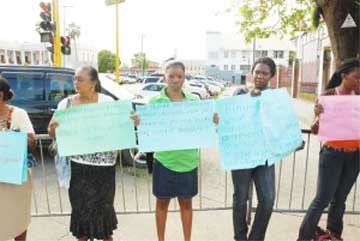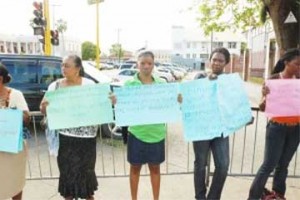(This is one of a series of fortnightly columns from Guyanese in the diaspora and others with an interest in issues related to Guy-ana and the Carib-bean)
By Alissa Trotz
Alissa Trotz is Director of Caribbean Studies at the University of Toronto, and edits the weekly In the Diaspora Column.
On Friday last, the Jamaican newspapers covered a performance by Sistren Theatre Collective, a 32 year old grassroots women’s organization in Jamaica. The play, ‘A Slice of Reality,’ dramatized the lives of poor women in order to make the argument for the legalization of abortion (Sistren’s executive Director, Lana Finkin, said it was a depiction of actual experiences drawn from two inner city communities in Kingston). What was striking about this story was that it was part of Sistren’s presentation to the Joint Select Committee of Parliament that has been hearing submissions since July of last year on the Report of the Abortion Policy Review Advisory Group (a group set up in 2005 to address, among other things, concern over the role of unsafe abortions in adolescent and maternal deaths).
As I watched excited e-mails fly up and down about the importance of Sistren’s intervention into parliamentary considerations, I could not help but think of the very different and recent experience of Red Thread and Grassroots Women Across Race on February 20th, when they attempted to attend the closing debate on the 2009 budget after picketing outside of Parliament against the decrease in the size of the promised single parents’ fund. I was at Red Thread that day, and was present for the discussion that took place before the women left for Parliament. We talked about who could go into Parliament in the context of what is deemed appropriate attire, as well as who might remain outside with the placards once some women went inside to hear the debate. Both actions made perfect sense together: to first stand in peaceful protest outside Parliament to remind the public of what was at stake; and then to witness the budget debate, as grassroots women whose lives are fundamentally affected by this issue.
Sometime after they left, the phone at Red Thread began to ring, at which point we learned that the police were preventing the women from entering Parliament. The reasons given were untrue and/or foolish: inappropriate dress (not true); following orders (“because I said so”). You have to ask yourself, aren’t parliamentarians the people’s representatives? What does it mean that grassroots women were denied entry on this most crucial of issues, or that a businessman was at the same time allowed to enter?
On February 24th, Red Thread member Andaiye wrote the Speaker of the House Ralph Ramkarran, requesting that he “publicly affirm the public right to enter Parliament to listen to debates”, explain “what limitations, if any, the Standing Orders provide on that right,” and “take steps to ensure that the Guyana Police Force is aware of this right.” In a response three days later, Speaker Ramkarran replied that under Standing Order 108 (1), the public can observe parliamentary debates “under such rules as the Speaker may make from time to time”. He noted that the Guyana Police Force is responsible for the security of the Parliament Building and for ensuring that no breach of the peace occurs in the Parliament Chambers. Ramkarran closed by recognizing Andaiye’s contribution to the struggle to restore democracy in Guyana, and inviting Red Thread to visit the Parliament Chamber as his guest for a future debate of its choice. In certain ways a welcome response (particularly the Speaker’s ready invitation to make his response public), one wonders whether an invitation is the only way that one can be guaranteed access to parliamentary debates? Surely the struggle for democracy entails more than that?
In his letter Speaker Ramkarran said that – as a layperson – he could not comment on whether there was a specific policy by the police with respect to picketers seeking entry into Parliament once the picket was completed. Another letter was sent on March 2nd to Minister of Home Affairs Clement Rohee, requesting clarification on three questions (the Minister acknowledged receipt of this letter, but Red Thread is still awaiting a full response):
1. Do the police have a policy of preventing people who have picketed the Parliament from entering Parliament to hear debates after picketing?
2. If yes, is this a blanket policy applying in all such circumstances or are the police to use their discretion?
3. If there is such a policy, how does it match up to the promise of increased openness of the National Assembly and the long-established right in Guyana to sit in the gallery and listen to the proceedings, as in the courts?
Elder Eusi Kwayana has offered his own take on this question, reminding us that these are rights we have fought for and earned, not favours to be withheld or distributed unevenly. I close this week’s column by reproducing Kwayana’s comments in full below:
In 1952, a young woman poet in the East Coast Demerara Youth Rally (DYR) wrote in a poem:
“If the big things need attention
the little things need still more”
That young poet was a philosopher. She moved away perhaps with her husband to do
farming elsewhere. I have never forgotten those lines. The DYR was a Youth organisation that some of us founded in those days. Most but not all of us were PPP, and we were not an arm of the party. We had our programme and our own song, I was not an official and no one tried to tell us what to do. The DYR was banned by the Governor in 1953.
I want to remind readers of my recent recommendation for a Commission to investigate the abuse of women. I believe that an open and malicious abuse of women took place on February 20th when the police barred some women who had been picketing the budget debate from entering the chamber to listen to the people’s representatives. I now know that the women were Red Thread members and others, and that they had left their pickets outside with a woman who did not try to go through the sacred gates. Several issues arise out of this “little” thing.
1. The act of the police was a serious breach of the freedom of citizens to enter the Assembly and listen to debates without exception. In the past, Speaker Sase Narain even had to deal with hecklers, whom he suppressed without any expulsion that I can recall.
2. Mr. Christopher Ram’s refusal to agree to enter when the women were denied, highlights the discrimination against the activist women who had been picketing. They could not go into the place that had passed brave laws about their freedom and equality.
3. If the Speaker knew of the incident, it would have been a good opportunity to tell the country that the exclusion was purely the work of the police and to affirm the citizens’ rights of listening from the gallery, a space provided precisely for this purpose. He could have spoken of the citizens’ access to the deliberations he conducts in the name of the people
4. Members of the National Assembly certainly have the right to raise this issue by one means or another. Will they?
There were days when we called the police, behaving as those ranks did on February 20, “Burnham Watchman”. Now are they “Jagdeo Watchman?” In both cases they uphold not the law, but the President’s head!
Some will say that it is not discrimination against women. If not, it is equally unacceptable if it is discrimination against those who raise questions about the impact of the 2009 budget on poor people.






